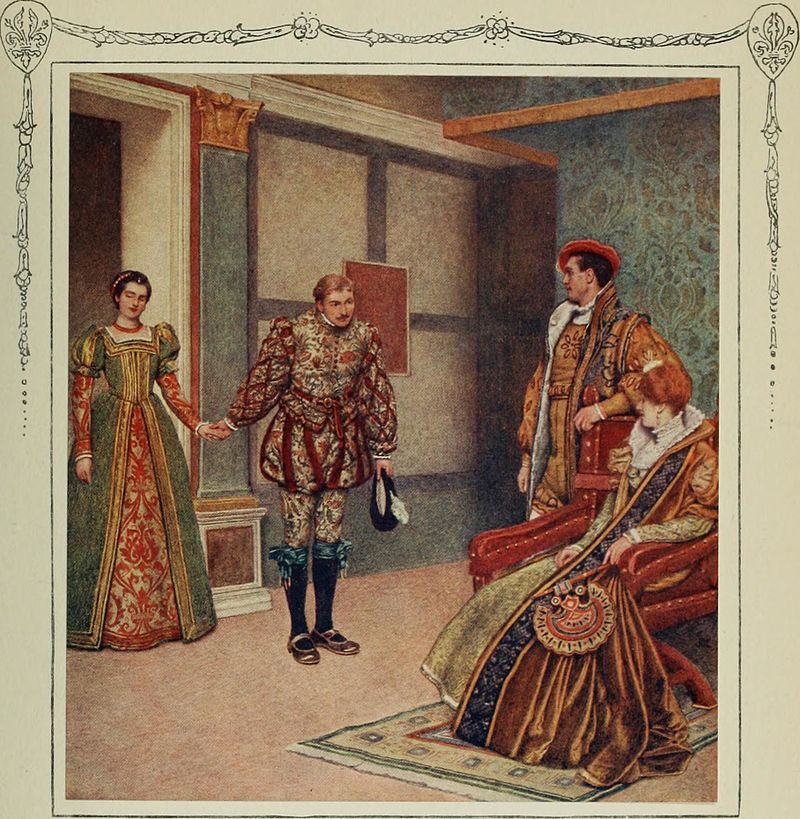Part of our series exploring the Merchant of Venice, this study note contains summary and analysis of Act 3 Scenes. Antonio's fate seems sealed as his ships wreck and he is arrested whilst Bassanio wins Portia's hand.
Pinned to
2751
0
0
No tags specified

|
Created by Antonia Blankenberg
almost 8 years ago
|
|
Rate this resource by clicking on the stars below:




 (0)
(0)
Ratings (0)
| 0 | ||
| 0 | ||
| 0 | ||
| 0 | ||
| 0 |
0 comments
There are no comments, be the first and leave one below:
Close
9579499
note
2018-10-03T15:15:00Z
2/5
Act 3 - Scene 2
- Back in Belmont, Portia tries to convince Bassanio to delay choosing a casket so they can stay together longer. Bassanio insists that he make his choice then to avoid prolonging the torment of living without Portia as his wife. Portia allows it, comparing Bassanio to the Greek hero and demigod Hercules, and tells her servants that this choice is no ordinary choice; therefore, she would like music to be played while he decides.
- Bassanio carefully examines the three caskets and puzzles over their inscriptions. He rejects the gold and silver caskets and chooses the one made of lead, which he opens to reveal Portia’s portrait, along with a poem congratulating him on his choice and confirming that he has won Portia’s hand.
- Portia presents him with a ring, a symbol of their union, that he must never part with, as his removal of it will signify the end of his love for her.
- Nerissa and Gratiano congratulate them and confess that they too have fallen in love with one another, suggesting a double wedding. Portia agrees to the double wedding, and Gratiano boastfully wagers that he and Nerissa produce a boy before they do.
- Lorenzo and Jessica arrive to Belmont where Salarino has given a letter to Bassanio. Antonio has written that all of his ships were destroyed, and that Shylock plans to collect his pound of flesh. This makes Bassino feel guilty, which prompts Portia to offer to pay twenty times the sum of the original loan. Jessica worries that her father is more interested in revenge than in money. Bassanio reads the letter again, Antonio told him that he doesn't care about the value of the loan and that he only wants a brief reunion before he dies. Portia urges her husband to rush to his friend’s aid.
Analysis:
- Bassanio’s successful choice seems inevitable and brings the drama of the caskets to an end. Bassanio’s excellence is made clear in his ability to select the correct casket, and his choice brings the separated strands of the plot together. This touches on one of the central themes of the play, the contrast between appearance and reality; what appears to be valuable (gold and silver) turns out to be worthless, and what appears to be worthless (lead) turns out to be valuable. Bassanio is enabled to judge rightly when others fail because his motive is love, rather than pride or the desire for worldly gain.
- Portia's efforts to delay Bassino choosing a casket are evidence that she loves him. The charm of her speech lies in the fact that Portia cannot openly admit her love. Her attempts to verbally circumvent stating outright her feelings for Bassanio lead her to utter absolute nonsense. However, she is still the heroine of the scene; she makes a decision while Bassanio panics and immediately attempts to put it into effect. She says: "First go with me to church and call me wife, / And then away to Venice to your friend!".
- The central idea in the song that is used as background music while Bassanio is making his choice of caskets focuses on the word "fancy". Fancy, for Elizabethans, carried the meaning of whimsical affection.
- Jessica is ignored by Portia and the others at Belmont. Her testimony against her father may be an attempt to prove her loyalty to the Christian cause, but the coldness of Portia, Bassanio, and the others is an understandable reaction. Lorenzo may love her, but her being the daughter of the antagonist and a Jew remains an object of suspicion for the others.
Important Quotes:
- "I pray you, tarry. Pause a day or two
Before you hazard, for in choosing wrong
I lose your company. Therefore forbear awhile." - Portia
- "So may the outward shows be least themselves.
The world is still deceived with ornament.
In law, what plea so tainted and corrupt
But, being seasoned with a gracious voice,
Obscures the show of evil? " - Bassanio
- "When I was with him I have heard him swear
To Tubal and to Chus, his countrymen,
That he would rather have Antonio’s flesh
Than twenty times the value of the sum
That he did owe him. " - Jessica
- "Pay him six thousand and deface the bond!
Double six thousand, and then treble that,
Before a friend of this description
Shall lose a hair through Bassanio’s fault.
First go with me to church and call me wife,
And then away to Venice to your friend." - Portia

